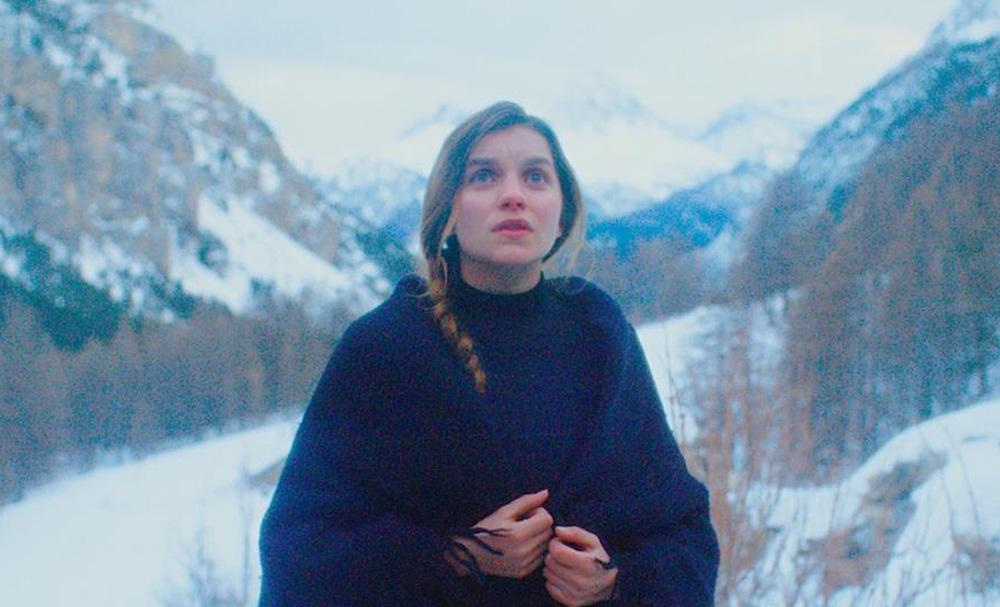If Miss Lazare (Galatéa Bellugi) sees the turn of the century as the start of a brighter future in “The Girl in the Snow,” she’s quickly disabused of that notion by one of her students in the small mountain village of Soudain where she has come to teach for the winter. Far from civilization in the Alps, it always feels a touch colder inside than out for the progressive educator who sees herself bringing knowledge to a community that would otherwise have no access to the world around them. While she came with no illusions about enlightening the elders who are set in their ways, she can’t help but be alarmed by how a fatalism has already reached the the children when the very youngest of her pupils answers her hopeful question of what she imagines the year 2000 will look like with the true but grim likelihood that everyone in the room will be dead a hundred years from now.
Miss Lazare might be further disappointed if she actually lived to be that old when her time bears a strong resemblance to the century we live in now in Louise Hemon’s wily drama where the teacher’s best efforts to improve life in the area with modern science and technique are met with disdain. It’s a particular tragedy in the case of Miss Lazare, who can be seen getting hot and bothered by late night reading about Descartes and she isn’t only made to feel lonely by her intellectual prowess, but by her burgeoning sexuality which is unlikely to be satisfied in the village where the men are largely indifferent towards her. She brightens at the thought of befriending women, though most have left to work as maids for families in the valley and the elderly pair that remain speak in an ancient tongue that’s indecipherable to her, requiring translation from the younger men usually to relay old wives’ tales that help explain where their fear of outsiders comes from or to chastise her for being a part of the problem, having the radical notion to bathe the children when the elders insist the dirt forms a protective crust on their skin.
When Miss Lazare’s attempts at breaking through the tough skulls of the villagers in any way appear futile, “The Girl in the Snow” turns into a tale of self-preservation when despite her increasing disillusionment with the community, she’s intent on making the best of it. A rare moment of enjoyment comes during a late evening with Enoch (Matthieu Lucci) and Pepin (Samuel Kircher), the two men around her age in the village, when she starts to make a connection after a celebratory dinner upon the rare occasion of fresh meat, but the reality hits the next morning that she will forever an outsider when one of them goes missing and as impractical as it would be for her to have played a role, her presence alone inspires distrust that can’t be argued with.
After stealing scenes in films such as Carolina Cavalli’s “Amanda” and Ahn Hung Tran’s “The Taste of Things” with her slightly incredulous glare and generally stoic reserve, Bellugi holds the screen well all on her own as the locals try Miss Lazare’s patience and the actress can express her skepticism with a crooked grin and seems perfectly suited to Hermon’s occasionally saucy sense of humor. As the character increasingly fears she’s stranded in avalanche country, there’s a worry that the filmmaker could be as well in the “The Girl in the Snow”’s final third when more disappearances lead to fewer places for the story to go other than burrowing deeper into Miss Lazare’s head, as compelling as that is for the majority of the run time. However, the film remains engaging throughout, in no small part due to Marine Atlan’s cinematography where the shadows and darkness have a real life as fire dances around and inside of them, and arrives at an exquisite climax in which the community’s complicity and acceptance of denying the future in favor of preserving the only life they’ve ever known can be crisply seen by pulling back the camera on the mountain town. It may be too big a hill for Miss Lazare to climb, but Hemon cuts it down to size quite brilliantly.
“The Girl in the Snow” will screen again at the Cannes Film Festival as part of Directors Fortnight on May 16th at 2 pm at the Alexandre III and 4:30 pm at Le Raimu.




